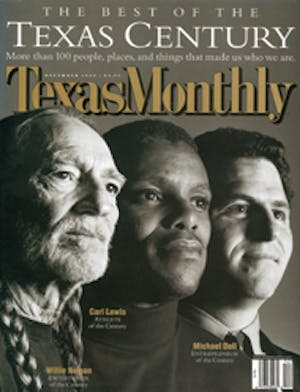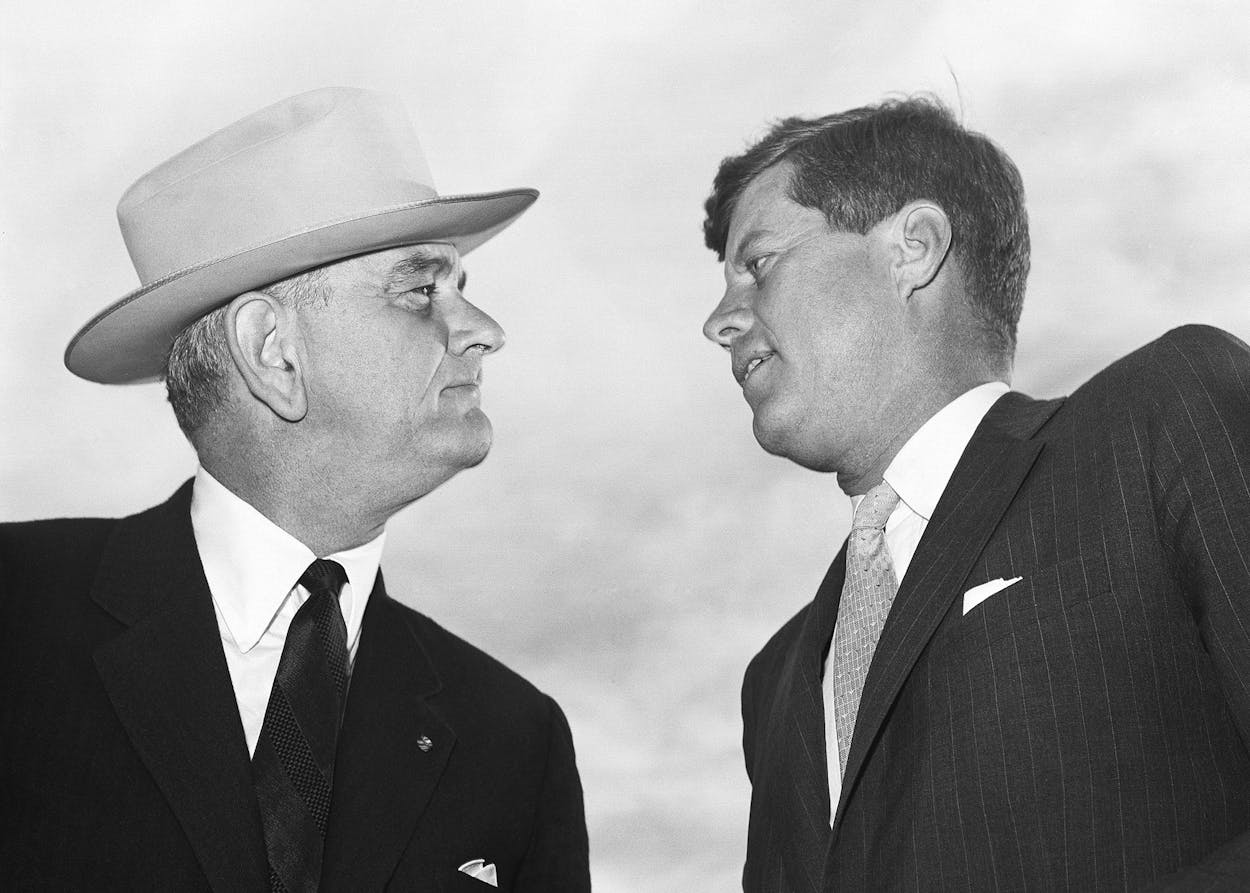When Lyndon Johnson was born on August 27, 1908, a neighbor named Otto Lindig arrived on horseback four hours later, took one look at the baby, and predicted that he would be governor of Texas some day. It was the underprediction of the century. How could Lindig, a simple Hill Country farmer and horse trader, have known how thoroughly the firstborn child of Rebekah and Sam Johnson would dominate the Texas political arena in his lifetime and beyond? Johnson continues to tower over Texas politics not just because he was the first Texas-bred president (Eisenhower was the first to be born here), not just because of all he did to reshape America in the area of civil rights and confound America in Vietnam, but because, 26 years in his grave, Johnson continues to extend the very idea of Texas into American political history, with all our flair and faults. More than any president since the early Virginians, Johnson took his roots with him into the White House.
No one would be more delighted with this turn of events than Johnson. He wanted to set records, to do more, to be the best, to surpass all predecessors, to answer all critics. “Get those coonskins up on the wall,” he would tell his staff—meaning, pass more legislation, win more elections, make more history.
Johnson’s vision of America was steeped in the mythology of Texas. His great-great-uncle John Wheeler Bunton was a delegate to the convention that wrote Texas’ declaration of independence in 1836 and fought in the Battle of San Jacinto. Johnson saw his ancestor and the colonists in New England who declared themselves free of a foreign power as part of the same tradition—a view of history not accepted by the Northeasterners he was always uneasy around. The most celebrated aspect of the Texas struggle for independence—the vow at the Alamo to fight to the death, to never retreat—took a darker turn in Johnson’s decision to pursue the war in Vietnam. “Hell, Vietnam is just like the Alamo,” Johnson told the National Security Council. “Hell, it’s just like if you were down at that gate and you were surrounded and you damn well needed somebody. Well, I’m going to go—and I thank the Lord that I’ve got men who want to go with me.”
Long before Johnson reached the White House, he had established himself as the prototype of the modern Texas politician. He was tall, rich, rough-hewn; he owned a ranch and dressed and spoke like a Texan. An early and important influence was World War I—era governor Jim Ferguson, a populist Democrat who was impeached in 1917 for financial misdeeds but refused to leave politics, successfully running his wife for governor instead. LBJ’s father, elected to the Legislature in 1918, continued to support Ferguson as one who did what was right for the “peepul,” and Johnson’s boyhood impression of the flawed hero stayed etched in his memory even as he evolved into a larger version of the same thing. As president, LBJ once turned to one of his top aides from Texas in a Cabinet meeting and said by way of self-explanation, “I’m a Ferguson man, through and through.” Later, several Cabinet members asked the aide from Texas, Who was this guy Ferguson?
After Ferguson, the next major political influence on Johnson was John Nance Garner, a former congressman from Uvalde who was Franklin Roosevelt’s vice president when LBJ was elected to Congress in 1937. Cactus Jack was the first Texan to hold national office, and Johnson patterned his career after “the wise old man of Congress,” as Garner was also known, in two ways. Like Garner (and Sam Rayburn), he became a master of the legislative process, and also like Garner, he believed in getting every Yankee dollar out of the federal government that he could lay his hands on.
Johnson added another Texas stereotype to his image in his 1948 Senate race against Governor Coke Stevenson. Johnson won the election by 87 votes, thanks to belated votes from the infamous Box 13 in South Texas. The narrow margin earned him the nickname of Landslide Lyndon, and it forever cast him—and future Texas politicians—as a wheeler-dealer, a pejorative phrase that began to be linked with LBJ after the race. One of the many legacies of that campaign is the caricature of Texas politicians as tainted.
When he became a national figure in the fifties as the Senate majority leader, the Texas stereotype continued to define him. Upon buying what would become the LBJ Ranch in 1951, he set about remaking himself in the image of a cattleman, but instead he was often characterized in the national press as just another vulgar, rich, and crude Texan. The stories are legion: the president showing off his scar from an operation, serving barbecue to the chancellor of Germany, and driving reporters across his ranch at breakneck speeds. Johnson saw himself as a Westerner, but Northerners, from intellectuals to political bosses, saw him as a Southerner. Anti-Southern feelings were so strong in the country that Johnson never would have been president had John Kennedy not named him as his running mate in 1960.
After Kennedy was assassinated, Johnson used the power and resources of the federal government to transform Texas and the rest of the South—against its will, of course. Part of his motivation for pushing for the passage of civil rights legislation, according to LBJ biographer Robert Dallek, was that he understood that “segregation not only separated the races from each other, but it separated the region of the South from the rest of the nation.” The volume of legislation that Johnson passed as president seems colossal. In the first two full years of his presidency, 1964 and 1965, Johnson submitted and Congress enacted more than two hundred pieces of legislation. Today if a president passes two major bills in a session, it’s regarded as a Herculean feat. Although his War on Poverty programs have fallen out of political favor, eleven of the twelve are still in operation and are funded at an annual rate exceeding $10 billion.
Johnson used to tell friends and family that he didn’t want to be remembered as a “can’t-do man,” and to make sure that he wasn’t, he tape-recorded his conversations in the White House—ten thousand of them—from his first month in office to the last. Unlike Richard Nixon, whose recordings reveal him as even smaller and meaner than his enemies regarded him, Johnson comes across as larger, smarter, and infinitely more complex than he was viewed by his critics. But there is also, in every conversation, that drawl, that Texan way of talking that made him so easily caricatured. It is impossible to listen to the tapes without reflecting upon how different Texas is—how very separate—from the rest of the country. Consider this recently released tape with Sargent Shriver, brother-in-law to the late President Kennedy, on the day that Johnson called to ask Shriver to take charge of the War on Poverty.
Johnson minces no words: “Sarge, this is your president speaking, and I’m going to announce you as head of the War on Poverty.” Shriver responds, “Can’t we just study this a little?” He suggests getting back to Johnson in a few days. Fat chance. Johnson wonders if Shriver has the “glands” for the job.
“I’ve got plenty of glands,” Shriver says, defensively.
“Well,” Johnson says, “I’d like to have your glands. Indeed, I’ve been going to some old doctor and I’m trying to get some of those old goat glands I’ve heard about.” At this point, Shriver can be heard saying to his wife, Eunice, “Well, I guess I’m the head of the War on Poverty.”
Like Shriver, we can’t resist him. Old goat that he was, LBJ is still the Texan who personifies his state to the nation and the world—our customs, our speech, our ghosts. He brought us into the American pantheon, and even today he is the one who keeps us there.
- More About:
- Politics & Policy
- LBJ







